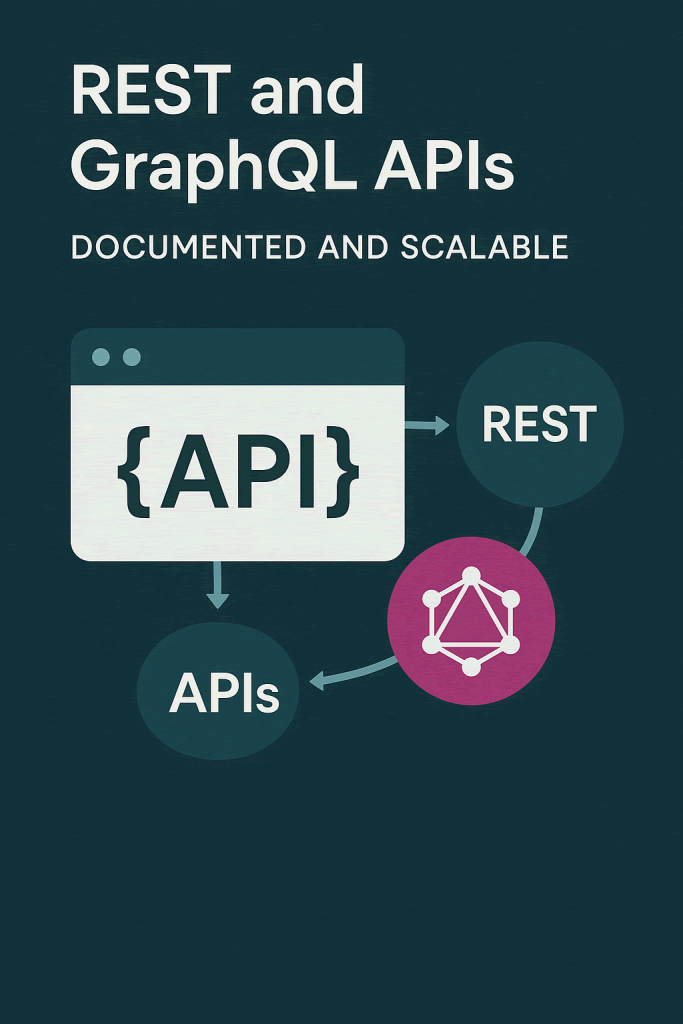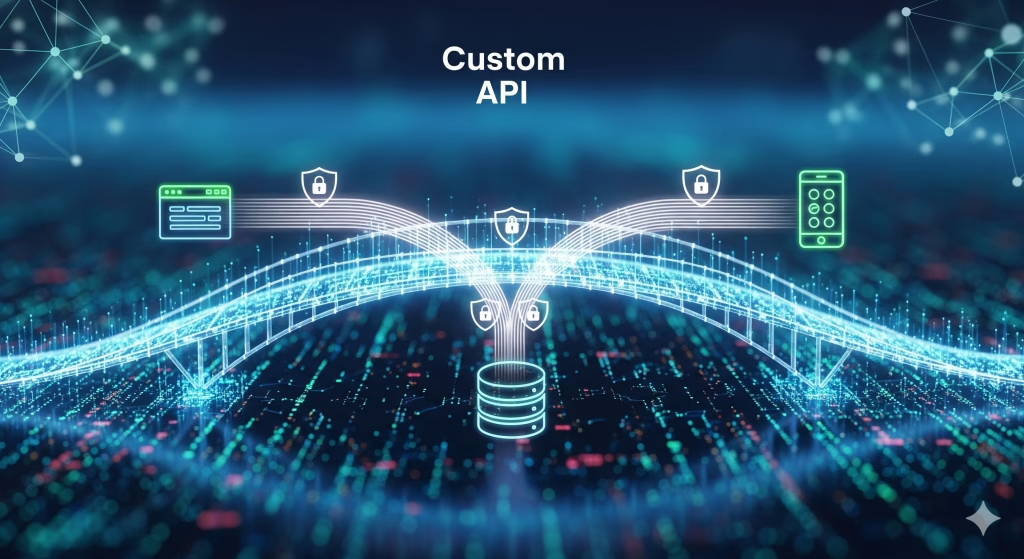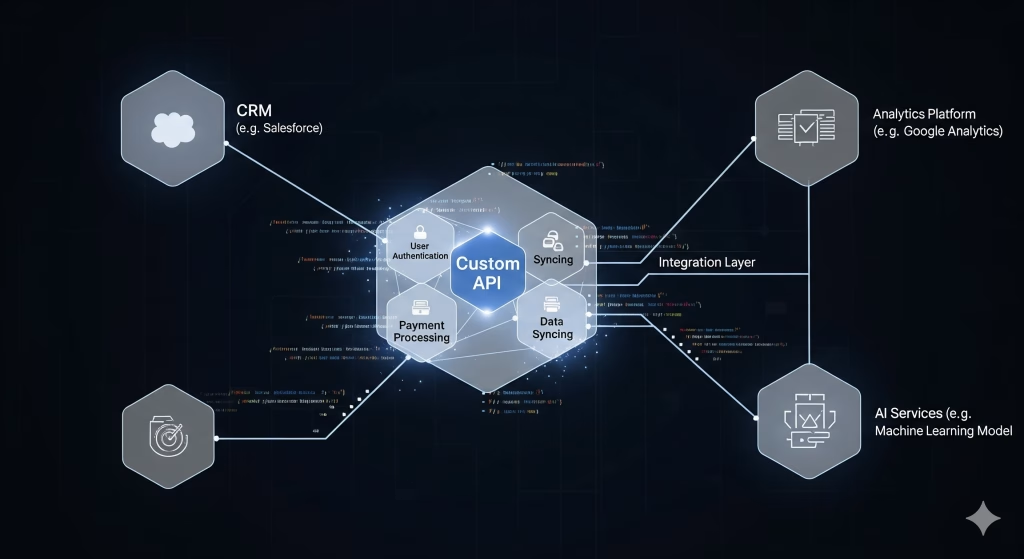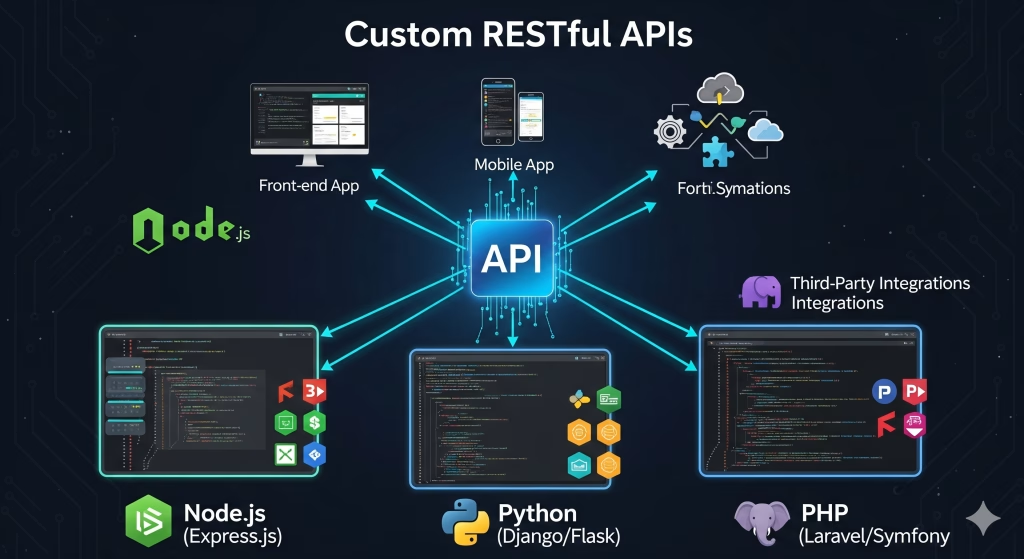Yes, Wemaxa offers custom API development as part of our advanced service tiers, including Professional, Enterprise, and App Development packages. APIs (Application Programming Interfaces) are essential for enabling secure and efficient communication between your website or app and other systems, whether it’s a third-party service, a mobile application, or an internal database. By building custom APIs, we give your platform the flexibility to integrate, scale, and perform exactly as your business requires.

📦 Use Cases We Cover
- Web front-end and mobile app backends
- Client dashboards or admin portals
- Third-party service integrations (e.g., Stripe, SendGrid, OpenAI)
- Headless CMS setups for decoupled content delivery
- AI-powered microservices and data processing pipelines
Our team creates APIs tailored to specific functions such as user authentication, payment processing, data syncing, or interaction with external tools like CRMs, analytics platforms, or AI services. We ensure that every API is designed with clear documentation, predictable endpoints, and strong validation rules to support seamless integration and developer collaboration. Whether your platform needs a public API for partners or a private one for internal systems, we handle it with precision and care.
Security is a major focus throughout our API development process. We implement token-based authentication, request throttling, and input validation to protect your data and services from unauthorized access or misuse. APIs are also tested for performance and resilience to ensure they can handle high volumes of traffic without slowing down or breaking under load. Every endpoint is carefully monitored and optimized to meet your performance goals and operational needs.
🧩 API Integration Services
In addition to building APIs, we integrate with external APIs:
- Payment: Stripe, PayPal
- AI: OpenAI, Hugging Face
- Email: SendGrid, Mailgun
- Analytics: Google Analytics, Mixpanel
- Authentication: Google OAuth, Facebook Login
🔗 API Development Services at Wemaxa
✅ 1. Custom RESTful APIs
- Built with frameworks like:
- Express.js or NestJS (Node.js)
- Django REST Framework (Python)
- Laravel (PHP, if the project requires)
- Ideal for powering front-end apps, mobile apps, and third-party integrations.
- All endpoints follow best practices for URL structure, versioning, and data format (usually JSON).
✅ 2. GraphQL APIs
- For projects requiring more flexible and efficient data queries.
- Implemented using:
- Apollo Server (Node.js)
- Hasura (PostgreSQL-backed auto-generated GraphQL)
- Useful in SPA/PWA applications with dynamic frontends.
✅ 3. API Security
- Endpoints protected by:
- JWT (JSON Web Tokens)
- OAuth2.0 flows for authenticated access
- Rate limiting and IP whitelisting
- All requests served over HTTPS.
For clients in the Enterprise and App Development tiers, APIs are often central to the entire project architecture. We design them not only to meet current use cases, but also to be flexible enough for future extensions. This modular approach helps reduce technical debt and supports long-term scalability. At Wemaxa, creating smart, reliable, and secure APIs is a core part of delivering powerful, future-ready digital systems.
MORE LINKS:
What is Fullstack?
What is Backend?
Supported Databases
Data storage methods
3rd party services
Hosting Setup
Backend developer
Project scaling
Average turnaround
DO YOU CREATE CUSTOM APIs?
When clients ask “Do you create APIs?”, Wemaxa’s answer extends far beyond a simple yes, because what we deliver is not just a functional interface but a full architectural foundation designed for scalability, security, and long-term growth. We build both **REST** and **GraphQL APIs**, carefully tailored to match the workflows, integrations, and future plans of each client. REST APIs, which remain the global standard in web development, are implemented using precise and predictable HTTP methods such as GET, POST, PUT, and DELETE. We design each endpoint with a human-readable, logically structured hierarchy that makes sense to developers and third-party integrators alike. Instead of cluttered or confusing routes, we create APIs with intuitive URL paths (e.g., /v1/customers or /v2/orders/invoices), enabling clear communication across systems. We also pay close attention to the principles of statelessness and caching, ensuring that our REST APIs are reliable and efficient under heavy load. For projects requiring greater flexibility and performance such as complex e-commerce platforms, social networks, or analytics dashboards we implement **GraphQL APIs**. GraphQL allows front-end clients to request precisely the data they need, cutting down on over-fetching or under-fetching, and significantly improving performance on mobile devices or slower connections. By designing APIs with future extensibility in mind, Wemaxa makes sure that today’s integration won’t become tomorrow’s bottleneck.

The process of designing and creating APIs involves far more than simply exposing a database it is about creating a **secure, well-documented, and maintainable interface** that can stand the test of time. Wemaxa prioritizes clear communication with developers, which is why we provide structured documentation using **OpenAPI (Swagger)** for REST endpoints or detailed schema definitions for GraphQL APIs. This documentation is not an afterthought but an integral part of the development process, ensuring that internal teams, external partners, or third-party service providers can integrate seamlessly without guesswork. Each API we develop comes with thorough explanations of query parameters, authentication flows, pagination rules, and error-handling structures. We standardize error messages and status codes to provide clarity, making debugging and integration straightforward. Beyond documentation, we embed **security at the protocol and application layers**. All APIs are protected via HTTPS/TLS encryption, ensuring that no sensitive data is transmitted in plain text. We enforce **authentication protocols such as OAuth 2.0 and JWT (JSON Web Tokens)**, and in high-security cases we implement additional measures like IP whitelisting or signed request headers. Our architecture includes **rate limiting and throttling controls** to protect against denial-of-service (DoS) attacks or abuse from rogue clients. This multilayered security strategy transforms APIs into trustworthy business assets rather than potential vulnerabilities.

Modern digital ecosystems rely on APIs as their backbone, and Wemaxa builds APIs specifically designed for integration, interoperability, and **ecosystem expansion**. A well-built API allows businesses to avoid siloed systems, instead creating fluid communication channels between websites, mobile applications, back-office software, and third-party services. For instance, an e-commerce site powered by Wemaxa’s APIs can seamlessly connect to external payment processors like Stripe or PayPal, integrate real-time inventory systems, push analytics data into platforms such as Google Analytics, or connect marketing workflows to email services like Mailchimp. APIs also make it possible to enable headless CMS architectures where the back-end manages content but the front-end is delivered through custom frameworks like React, Vue, or Angular. Wemaxa builds APIs for mobile apps, ensuring that iOS and Android clients can pull user-specific content, synchronize sessions, or trigger push notifications in real time. By building APIs with a philosophy of **integration-first**, we ensure that your digital products can evolve alongside future platforms, third-party tools, and industry standards without requiring costly rewrites.
API development at Wemaxa also encompasses **deployment, scaling, monitoring, and lifecycle management**, because an API is only valuable if it continues to perform consistently in production environments. We deploy APIs on resilient infrastructure, whether containerized services using Docker and Kubernetes, serverless platforms like AWS Lambda and Azure Functions, or traditional backend stacks optimized for long-term hosting. Our deployment strategy emphasizes horizontal scaling so that APIs can handle traffic spikes without downtime. Once deployed, APIs are continuously monitored using performance dashboards, logging systems, and observability tools that track latency, throughput, and error rates in real time. Automated alerts are configured to notify teams of anomalies, while logs are securely stored for auditing and debugging. Wemaxa also enforces structured versioning, meaning that when new features are introduced, older clients can still interact with previous versions without disruption. This ensures that businesses can innovate quickly without alienating existing integrations. The lifecycle of an API also includes **sunsetting strategies**, where deprecated features are phased out gradually, communicated clearly to developers, and replaced with more efficient alternatives, maintaining trust and stability in the long run.

To summarize, Wemaxa does not just create APIs we build the foundation for digital ecosystems through **professionally engineered, secure, scalable, and well-documented APIs**. Our REST and GraphQL solutions are designed to empower websites, mobile apps, CRMs, and third-party platforms with predictable performance and strong security. We deliver every API with full documentation, integration guidance, and monitoring strategies, ensuring that your business operations are not only supported but strengthened. APIs represent the glue that holds together modern software systems, and by relying on Wemaxa’s expertise, companies can confidently scale their digital services without fear of fragmentation or technical debt. Whether your project requires lightweight endpoints for a small app or a robust, enterprise-grade API powering multiple user-facing applications across the globe, Wemaxa ensures the delivery of a solution that is reliable today and adaptable tomorrow.


